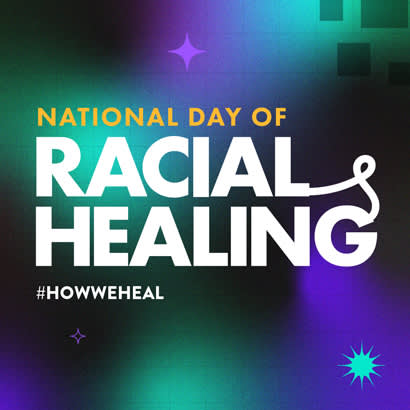
The 8th annual National Day of Racial Healing is set for January 16, 2024. Each year, hundreds of organizations across the United States observe and honor the day by creating experiences for people to connect, build relationships and bridge divides.
Parks and recreation spaces offer a perfect place to bring neighbors together for healing and connective experiences. We have seen organizations embrace the day in so many ways, from intimate coffee chats, movie nights for kids, community-wide panel discussions on racial disparities, and even a two-day interactive arts festival where community members created a gallery together.
Racial healing may not be a familiar term for everyone. Essentially, it acknowledges that every one of us has been impacted and harmed by racism, even if we are not aware of it. For people who are Black, Indigenous, Latinx and Asian or Pacific Islander, the impacts show up clearly as barriers to accessing the essentials of life, such as quality education, jobs, income, housing and greenspace. Racism also deeply traumatizes people of color who experience hate and extrajudicial violence.
The harmful impacts for white people, like me, may be less clear. Racism can give us a skewed sense of identity when we consciously or unconsciously buy into the notion that we are the most important members of society and more worthy of privileges. It also compromises our moral compass, allowing our privilege to override our natural sense of fairness.
Since we are all affected by racism, we all need opportunities to heal. Our minds and hearts need healing from harmful beliefs. Our bodies need repair from the toxic stress of racism. Our relationships need to heal, by removing the barriers racism places between us, which make neighbors more like strangers. Stronger relationships can help heal our communities and organizations; when we understand the struggles we each endure through racism, we are more likely to commit to creating real and positive changes that benefit everyone.
Parks and recreation spaces naturally attract a diverse cross-section of a community. I often go to the Battle Creek Regional Park in Saint Paul, Minnesota, for walks after work. When I’m there, I see Hmong and Karen families (from Myanmar), Somali, Ethiopian and Eritrean families, and white families each enjoying picnics and important celebrations, playing volleyball, or getting steps in on the trails. But often these activities are segregated by race or national origin. In those moments, I wonder what role park and recreation professionals could play in helping people connect, build relationships and bridge divides? What activities could park and recreation professionals create that would allow neighbors to meet, learn about each other’s experiences and possibly forge bonds that lead to change?
For ideas on how to honor the National Day of Racial Healing in your park or recreation space, please visit www.DayofRacialHealing.org. You’ll find a helpful action kit for creating racial healing experiences for children, youth and communities and an opportunity to submit your event to our national listing. Any activity that helps community members connect, build relationships or bridge divides counts!
Kari Carlson is the communications manager for W.K. Kellogg Foundation.


